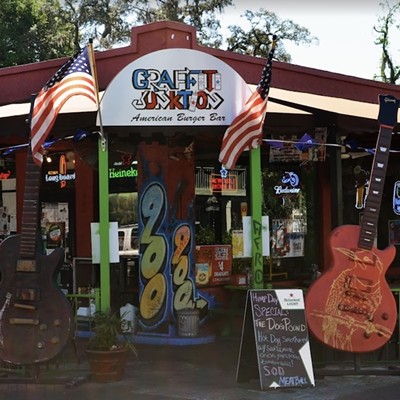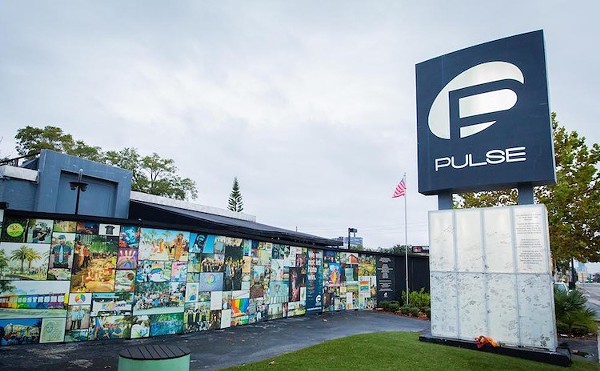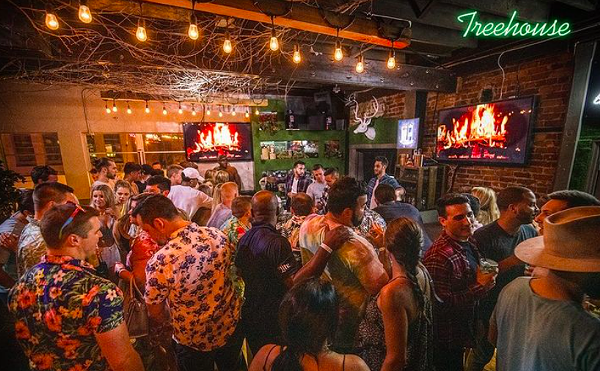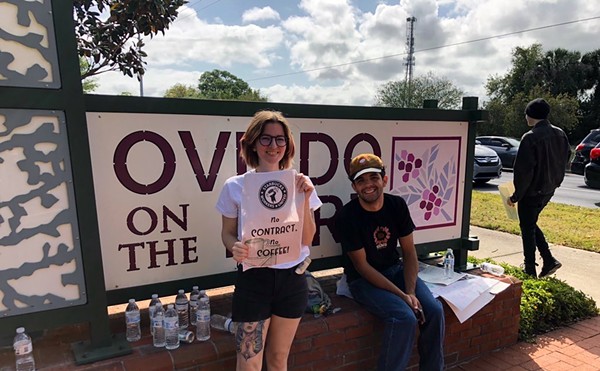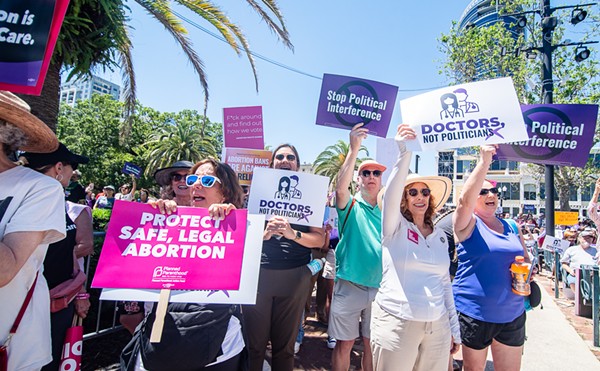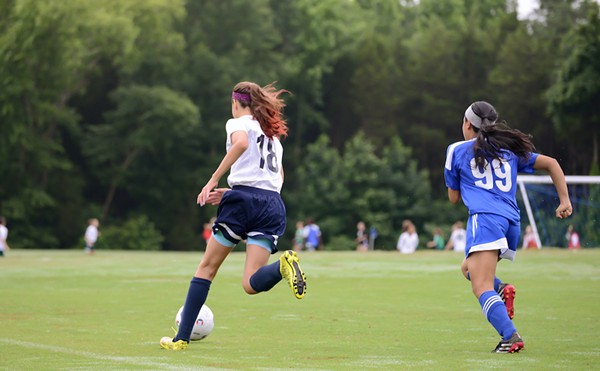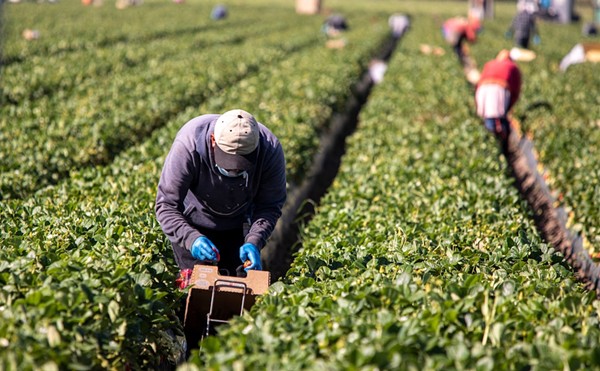It's been a tough year for North Miami resident Martin Gill. The 48-year-old gay foster parent and his partner should have been elated by the decision in their favor handed down in November 2008 by Miami-Dade circuit judge Cindy Lederman, formally allowing them to adopt the two boys, now ages 5 and 9, that they've been raising for nearly four years (see "Florida's case against gay adoption," Dec. 18, 2008). Instead, with the promise by Florida attorney general Bill McCollum to appeal the judge's ruling, Gill has been thrust into the limelight as the spokesman for the American Civil Liberties Union's campaign to overturn the state's gay adoption ban.
Gill now inhabits a tangle of politically tinged court appearances, and is fighting to keep his children. In August, oral arguments in Miami's Third District Court of Appeals presented by McCollum's deputy solicitor general, Tim Osterhaus, presented the possibility that the kids could be removed from Gill's custody and put in a different foster home to await adoption. The Department of Children and Families — who have paid McCollum's office $400,000 to fight the case — has thus far kept the battle from the Florida Supreme Court in what some are calling a political calculation aimed at next year's gubernatorial election.
In January, the ACLU brings the skirmish — and Gill — to Orlando, thanks in large part to a $150,000 grant awarded them by the Tides Foundation in July. While he'd rather be getting on with the business of looking after his children, Gill says over the phone from his Miami home, without laws to protect them, children tend to become the last concern in the debate over gay adoption.
Orlando Weekly: You had a background as a foster parent in the past with eight children. What made you choose foster parenting in the first place?
Martin Gill: My partner and I were raising his son, and we decided for a whole number of reasons that we wanted to become foster parents. At first I didn't realize that in Florida you could be foster parents, and then Rosie `O'Donnell` had come out and all that stuff, and that made us aware that while you couldn't adopt here, you could become foster parents, and I thought, "That's great." So we had one son and we thought we were doing a pretty good job with him.
In 2002 we went to training together as a couple and we made it clear from day one that we were a couple, because we didn't want — knowing that on one hand it's illegal to adopt — we wanted them to know where we stood, and we didn't want it to come back on us or anything. They thought that was great. That was with DCF. We became licensed foster parents a few months after that, in 2003. Honestly, the kids that they were giving us — they never said so, but the kids that they were giving us were all not good candidates for adoption, because we made it so clear that we were a gay couple. …
And then in 2004, I lost a baby girl — I didn't lose her, she went back to her mother. I had her for the first six months of her life. I took her for six months and the mother got her back, and that time I was really hurt, because this is a baby `who came to us at` two days old and still had her umbilical cord attached. The mother didn't visit but three times for the entire visitation period of six months, and yet the mother got her back. Not that I disagree with that decision; it just hurt.
We made a decision that we would move to Georgia, and we bought a small mansion in Georgia for like $130,000; it wasn't a whole lot of money. Six thousand square feet, seven bedrooms, and we were planning on moving up there. You can kind of transfer your license, you don't have to go through `foster parent training` class all over again. You just license the home. So we were going to take on probably the maximum number of foster kids, which is five, and just do that up there. If a little baby girl like that came up for adoption, we would at least have that option. We weren't thinking that we've got to adopt, but at least we would be considered as equals in Georgia.
How were you contacted about the two boys?
They called and asked if we could take two boys. It was Dec. 11, 2004. They call right before they bring the `kids over`. I said no, it would be an injustice because we were moving to Georgia, although we weren't moving to Georgia until summer because we had a child in school. …
I kept saying, "No, no, no," and they said, "Wait, this will just be a temporary placement. When are you moving?" I explained in June. And she said, "This is just a temporary placement, one or two months, because I have a family member for them."
She said, "You can give them a really nice Christmas. What are you doing for Christmas?" And then that got me, because I was planning this huge Christmas celebration. My mother was coming, `Gill's partner's` mother was coming, all of these people were coming from out of town, and we were kind of hosting Christmas and I thought, "Two more little kids, we could really give them a good Christmas." So that kind of broke my heart. If we can take them, my experience is December is the month where nobody wants to take on a child, because everybody has plans or are leaving town. If we didn't take them, they would probably spend Christmas in a shelter. And that broke my heart. I was like, "Oh, come on, send them over." An hour later they were here.
A month later nothing happened, two months later nothing happened, then finally we found out indirectly through one of the kids' family members — because I was setting up some visitation through the grandmother and the great-grandmother — that the aunt who was going to take them had dropped out. Then one by one, everyone in that family decided, "No, I don't want to take on those kids."
Then, as the family met us, they also said, "You guys are the best people for these children."
June came, we didn't move. August came and finally we start questioning DCF. We say, "We're going to take these kids with us to Georgia, because it's already been over eight months. You need to prepare a transfer." And they were saying, well, they could do that, but they didn't want to do that because it's a lot of work. And so we finally end up in front of the judge and the judge says, "Are you willing to take permanency with these children?" I had met the judge before, and I said, "Well, you know the situation, we're gay, whatever. So I don't know what options are available to us." And she said, "Permanency means adoption."
That's at the point that we started looking at our options, and we chose — in interim — we said, well, OK, we'll stay another year. We put the kids back in school and stayed.
The court appointed us a lawyer through the guardian ad litem, and they were looking at the possibility of adoption. In the interim, I did some online research and we found the ACLU, who had lost a case with the Loftons. `In 2004, a federal appeals court ruled against Steven Lofton in his attempt to adopt the HIV-positive child he had fostered.` But, I'm one of those people, I kind of believe that maybe the best thing is that they just lost a case, because they have the experience and they know what they're doing.
Everyone talks about living the personal as the political, but you're really living the personal as the political. Since the beginning of your involvement in the gay adoption controversy, have there been any threats from religious or political activists?
None. Absolutely none. We got our day in court Aug. 26. We went to the appeals court and got our appeal, and that was the last part, the oral argument. Then right after our appeal, we had a press conference outside. As soon as we stepped down from the press conference, Mat Staver `of the anti-gay Liberty Counsel` stepped up and started his own press conference. The minute we walked away. He stands up there saying, "This is all about the best interest of the kids." He started saying some things that aren't true, like, "I could easily get 10 families that are willing to adopt these kids."
Well, I always carry with me all the things from the Heart Gallery `heartgalleryflorida.org`. There are hundreds of little kids that have been waiting for four years and that's how they get in the Heart Gallery. They're no different from my kids. My kids are victims of substance abuse and had to go through detox at birth. … Other people do not want to adopt these kids. And I'm not just saying my kids, but hundreds of kids. One of my kids has had a lot of problems. Here you have a 6-year-old who's a year behind his class, he has developmental problems.
And this goes back to when we finally signed off on the lawsuit. Before that, when a social worker came in to do a "marketing plan" — `DCF` does these to try to get them adopted — so they came into our home, and we're perfectly willing to keep them, but they're putting together résumés and taking their pictures so they can put them in a book and all the adoptive parents can choose from them.
And I'm helping them do this thing, and they're saying, "What we'll have to do, though" — and `the kids` are sitting in the room — they're saying, "The older brother is kind of beyond the age of adoption, people don't really like them past kindergarten, and he's kind of disabled." And I said, "Excuse me," and got up and put the kids in the bedroom and said, "OK, now we can talk."
"Well, we're going to have to split them up, because the older one won't get adopted, and he'll probably have to stay with you or in the foster program. But we can get the little one adopted pretty easily." The little one is bright and social and cute. He was 2 years old at the time, so he was still adoptable.
Part of why he was adoptable was because we had done such a great job with him. He's had all the advantages. He's been in day care. Then it was like, at that point, OK, we're going to adopt these kids. The `social worker` wasn't a bad guy, but he's been in the business so long that he's desensitized to the horrible things that they do to these kids.
When we got them they were 4 years old and 4 months old. On the first day, I go to change the baby's diaper, and the 4-year-old kind of butts me out of the way and he starts changing the baby's diaper. I just let him, to see what he was doing. Four years old and he did it in like 30 seconds. A little while later, I go to feed the baby, and — he wasn't talking, he didn't talk for a month — he tries to push me out of the way, so I let him sit next to me and hold the baby between us, and I let him feed the baby. When the baby finished his bottle, he flipped the baby over and burped him. This is a 4-year-old. It became clear that this was his brother's keeper. …
With all that history, then DCF just so coldly says, "Well, we'll just have to split them up."
The minute the initial court ruling came down in your favor, were you aware that there was going to be an appeal? Did the ACLU prepare you for that?
Before, we thought it would be appealed. The Key West decision came down `in September 2008, a Key West judge ruled in favor of gay adoptive father, Wayne Smith; the ruling was unchallenged` and they explained all that, that the Key West decision didn't mean anything for the state, for the rest of us, because the state didn't oppose it. So they're hoping that the state opposes this, because if we win, it's important for us, but it's not important for the rest of the state because the appeals court is the point at which the law really gets struck down. A circuit court judge doesn't really have that power. She has power over those kids and our family, but she doesn't have the power to change the law. …
So I knew all that going into it, but immediately I was elated. And in the back of my mind, you know, I'm a foster parent; yeah, I want everybody to be able to adopt, and yeah, I'm willing to do whatever it takes to make that happen, but at the same time there was part of me that said, "Don't appeal, just let us go. Don't appeal, just let us go." Because what's most important to a parent is that those kids are taken care of. Doesn't matter if you're gay or straight.
So we were elated. I was crying, which I've never cried like that before over a positive decision. I was just in tears. Then we're heading down to the press conference, and that's when they told me that the state had decided to appeal.
In his oral arguments this August, deputy solicitor general Tim Osterhaus made some reference to the fact that these kids should be put back up for adoption. How did that feel?
I worry every day. I love my kids, so I worry about them every day, and I worry about being in the street and what people think of us as a family and that kind of thing, but we have had no negative reactions, believe it or not. Could be that my partner's 6 feet, 4 inches and 220 pounds, but we've had no negative reaction at all. DCF all along the way has said, "We'll figure out something, positive or negative; we don't intend to take these kids away from you."
Then we get to the oral arguments and the final question and answer. The final question was from `Third District Court of Appeals` Judge `Vance` Salter, and he said, "What would the final disposition of the kids be if the decision was reversed?" And Osterhaus went into — it's hard to hear him because he's very soft-spoken — he said, "We'd have to get a court order and remove them from the home and put them into another foster home. At that point we would do our best to get them adopted by qualified families."
So the first thing that hit me was: Put them in another foster home? We are a foster home. Are they thinking that we're going to be hightailing it out of here with the kids? That was the first reaction.
Then Salter said, "Would the kids be grandfathered? Would the decision stand even though we're striking it down? Would there be some other alternative, like permanent guardianship?"
`Osterhaus` repeated that they would be taken away and put up for adoption. So my feeling was that this is mean-spirited. It's coming from politics. My kids are being used as political pawns. These are children. … You don't do that with children. This isn't about the best interest of the children, and that's what it's supposed to be about. Nobody agrees that this is in the best interest of the children. For politics, he was willing to stand up there and say that.
At home, does it feel like everything's up in the air? And how aware are they of what's going on?
I don't think this is really worth printing, but they love Michael Jackson and they've been really into all of the Michael Jackson things since his death. They sit here in the living room, and they clear all the furniture, and they do all the dances and things. But they keep playing this one song, "They Don't Really Care About Us," by Michael Jackson, like a militant song. It just seems like it's the theme of the whole Osterhaus thing.
You know, I don't explain court cases to them. I explain adoption. They get that adoption means permanency and changing their names. You know, I've told them over the years, each year when I put them in school I have to put them in under their old names, and they're kind of disappointed. The older one gets disappointed, and the little one's just in kindergarten. Really, we try as much as possible to keep all of this away from them and not let them know. I don't want them to hear that they could ever be taken away, because even if that's the reality, I mean, what kind of reality is that for a child? It's a horrible reality.


